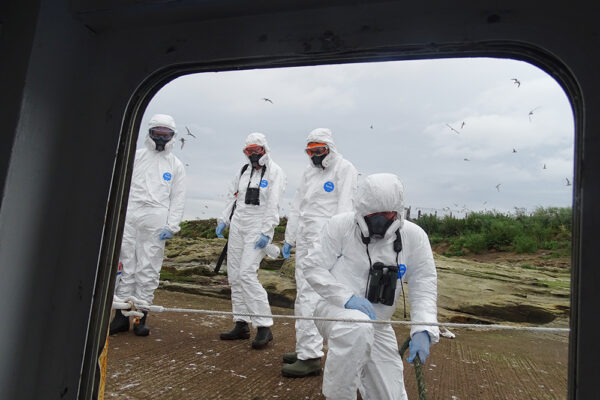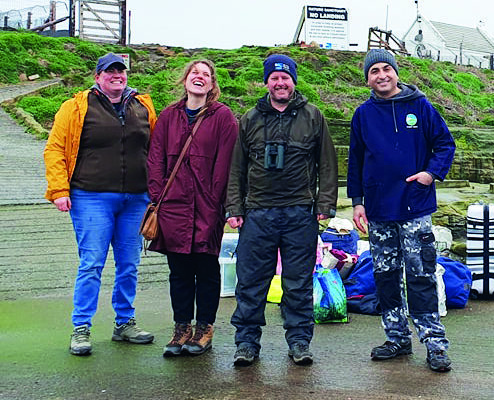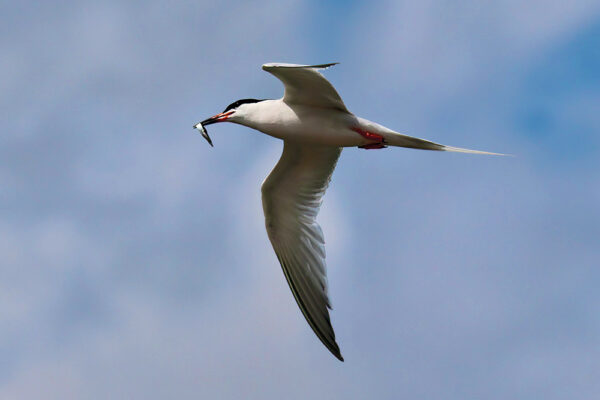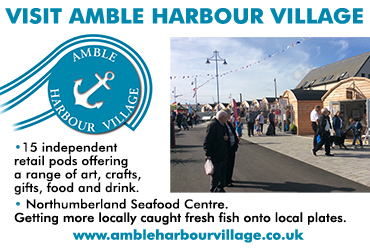New team on Coquet Island face another devastating season
Working with nature brings both constants and change, and so it is with the team and the wildlife on Coquet Island. After a turbulant year with avian flu (AI), and a change of personnel, we took the opportunity to check in with the team on the RSPB run bird reserve, to find out how they and the wildlife are faring.

Avian flu has once again hit Coquet Island’s rare bird colonies, meaning staff have to wear PPE. Hundreds of adult birds and chicks have died, including Black Headed Gulls, Common, Arctic and Roseate Terns. Photo: Ibrahim Alfarwi
First off, the island has a new site manager; Stephen Westerberg. Stephen has a wealth of conservation expertise, having worked for the RSPB for 19 years and previously been the Site Manager at RSPB Geltsdale in Cumbria for 13 years.
Those familiar with the team over the last few years will know site warden Ibrahim Alfarwi, who has been on Coquet for eight years, having completed his PhD on the island and then working there as the warden.

r-l: Ibrahim Alfarwi: Warden – Coquet Island Reserve; David Morris: Area Manager; Hanna Derewnicka: Assistant Warden; Mhairi Maclauchlan: Warden – Cumbria Coast Reserves. Photo: Puffin Cruises (Image taken in April before avian flu was confirmed on the island
This year the team includes assistant warden Hanna Derewnicka, and seabird assistants Lauren Band and Barry Mumford Lloyd.
Q: Last year avian flu hit Coquet Island very hard. How difficult was it for the wardens to see such death and suffering especially at breeding season?
Ibrahim Alfarwi told us, “It can be emotionally and physically tough seeing the impact of AI on such charismatic birds on the island, which we have worked for decades to conserve. Our experience last year enabled us to prepare for this breeding season and we are doing everything we can to support the colony. Time will tell what the long-term impact is on the colony.
“Fortunately, much of the important work to prepare the site at Coquet Island for the breeding season had already been done last season in preparation for the birds arriving in spring.
“Since the confirmation of AI on the island, we are continuing our conservation work with some changes. Whilst the birds are on the island and we continue to have AI in the wider seabird colony, the RSPB conservation team will conduct their work on day visits (rather than staying on the island overnight).”
Q: How is the breeding season this year so far? Has AI affected the island again?
As of 5 June 2023, AI has once again been confirmed on the island. Hundreds of Black Headed Gulls, adults and chicks have been found dead. Hundreds of Common Tern and Arctic Tern chicks have been found dead, and dozens of Common and Arctic Tern adults have been found dead.
“So far there have been 86 active Roseate Tern boxes and we put rings on 79 healthy chicks,” said Ibrahim. “Unfortunately since the beginning of July we have also begun to find dead Roseate Terns, including large numbers of chicks.”

Roseate Tern with sand eel Photo: Tom Cadwallender
Q: There have been reports of warming sea temperatures in the North Sea. Last year there were industrial trawlers off the Farnes. Do you think this is affecting the food chain for puffins, terns etc? There’s also reports of sewage in the sea just now – does this combine to make life very difficult for the birds?
Helen McLachlan, head of marine policy at the RSPB, told us: “The extreme marine temperatures we’re seeing are of deep concern, especially for seabird populations that are already struggling. Climate change leading to rising sea temperatures and more extreme weather events impacts the whole food chain, from some of the smallest creatures in the sea like plankton, upwards. That has knock-on effects for species like sand eels – a vital prey species for so many marine species including seabirds, marine mammals and commercial fish.”
Ibrahim said: “The presence of industrial trawlers, if not properly managed and regulated, can lead to overfishing and habitat degradation, further affecting the availability of prey for puffins, terns, and other seabirds.
“The presence of sewage can introduce pollutants and contaminants into the marine environment, potentially affecting the health of both marine organisms and the overall ecosystem.
“While it is challenging to determine the exact extent to which these factors are impacting the lives of puffins, terns, and other seabirds, it is reasonable to assume that they can collectively create difficulties for these species.”
Q: Back to avian flu – what measures would the RSPB like to see instigated nationally in response to this pandemic?
A spokesperson for the RSPB told The Ambler: “We are calling on the government to do more research. We need all four UK governments to take impacts on wild birds more seriously, do more to understand the disease and to move towards implementing effective management and conservation measures. Governments need to see bird flu as a wake-up call for action to restore and protect the UK’s wild species as part of our national response to the nature and climate emergency.”
Meanwhile, Ibrahim says he and the team are determined to face up to the situation: “Despite the challenges we faced last year, our dedicated Coqueteers team remains strong and unwavering in our commitment to protect and conserve our seabirds.
“Through our surveys, proactive actions, and close monitoring, we are working tirelessly to ensure the long-term survival of our beloved birds.”
Anna Williams













Ibrahim Alfarwi was caught on camera torturing a sick bird. How come he is still allowed to work there?